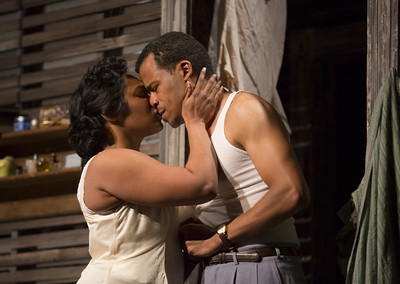Summary | Excerpt | Reviews | Beyond the Book | Read-Alikes | Genres & Themes | Author Bio

A Novel
by Rivers SolomonThis article relates to Model Home
 In Rivers Solomon's novel Model Home, main character Ezri Maxwell reflects on Lorraine Hansberry's 1959 play A Raisin in the Sun — about a Black family living in Chicago after World War II, the Youngers, who make plans to move to an all-white neighborhood. Ezri's Aunt Jacqueline compares the situation of the Youngers to Ezri's immediate family, Black people who lived in a white gated community in the Dallas suburbs during much of Ezri's youth.
In Rivers Solomon's novel Model Home, main character Ezri Maxwell reflects on Lorraine Hansberry's 1959 play A Raisin in the Sun — about a Black family living in Chicago after World War II, the Youngers, who make plans to move to an all-white neighborhood. Ezri's Aunt Jacqueline compares the situation of the Youngers to Ezri's immediate family, Black people who lived in a white gated community in the Dallas suburbs during much of Ezri's youth.
The title A Raisin in the Sun references Langston Hughes' poem "Harlem": "What happens to a dream deferred? / Does it dry up / like a raisin in the sun?" The play's characters include brother and sister Walter and Beneatha, their mother, and Walter's wife Ruth. Walter and Beneatha's father has died, leaving the family life insurance money, some of which their mother has chosen to use for a down payment on a house in a white neighborhood, though Walter wants to use it to open a liquor store. The questions of what will happen with the remainder of the money and whether the family will go ahead with the move provide the story's tension. Eventually, they are visited by a white man who tries to dissuade them from moving, indirectly threatens them, and offers to buy them out.
A Raisin in the Sun, inspired by Hansberry's own experiences, was the first Broadway play written by a Black woman, as well as the first to have a Black director (Lloyd Richards). James Baldwin later wrote of the work, "Never before, in the entire history of the American theater, had so much of the truth of black people's lives been seen on the stage."
Aunt Jacqueline uses A Raisin in the Sun to make a point about Ezri's mother's pride and determination, while also suggesting that a person may have good reasons to choose differently from the Maxwells and the Youngers: "[Y]ou could say a wise family would've listened, wouldn't have gone ahead to live with folks who clearly didn't want them there. But no, we see the act as brave. Or we're supposed to. That's your mama. She wasn't going to be run out her home."
Ezri thinks about how there was a scene in the original play that never made it into the Broadway performance or film version: "The part where one of the neighbors in their Chicago building couldn't fathom why the family wanted to move to a neighborhood of white people, because their house would probably get bombed."
The neighbor Ezri refers to is Mrs. Johnson, who appears in Act II, Scene II. Mrs. Johnson makes nosy, insinuating comments and clearly enjoys the opportunity to bring others down a notch, as when she dramatically conjures an imagined future newspaper headline about the Youngers' house being bombed, and then follows up with, "[Y]ou know I'm praying to God every day that don't nothing like that happen! But you have to think of life like it is." She proceeds to criticize Beneatha for her proud attitude, blaming it on her college education, and to remark that there is nothing wrong with Walter being a chauffeur, which ignites his mother's feelings about how her son deserves better than to be "any kind of servant."
The scene with Mrs. Johnson, obnoxious as she may be, complicates and adds weight to the family's resistance against racist expectations, clarifying the real dangers they face as well as their limited choices. Solomon's reference to this scene in Model Home highlights the resentment Ezri feels towards their parents for how their class aspirations intersected with the harm their children experienced, though this idea undergoes its own complications as the plot unfolds. It also emphasizes how inequality doesn't only manifest as a simple lack of money or opportunity. Like the Youngers, Ezri's parents chose to move where they did because it was economically sensible — a house in white suburbia cost the same as a small apartment in Brooklyn. Both families, because they were Black, could not just take the best deal without a second thought, but had to consider all the risks and implications of their decision.
Ashley Everage ("Ruth Younger") and LeRoy McClain ("Walter Lee Younger") in the Huntington Theatre Company's production of Lorraine Hansberry's A Raisin in the Sun, 2013
Via The Huntington on Flickr (CC BY 2.0)
Filed under Books and Authors
![]() This "beyond the book article" relates to Model Home. It originally ran in October 2024 and has been updated for the
October 2024 edition.
Go to magazine.
This "beyond the book article" relates to Model Home. It originally ran in October 2024 and has been updated for the
October 2024 edition.
Go to magazine.
Your guide toexceptional books
BookBrowse seeks out and recommends the best in contemporary fiction and nonfiction—books that not only engage and entertain but also deepen our understanding of ourselves and the world around us.